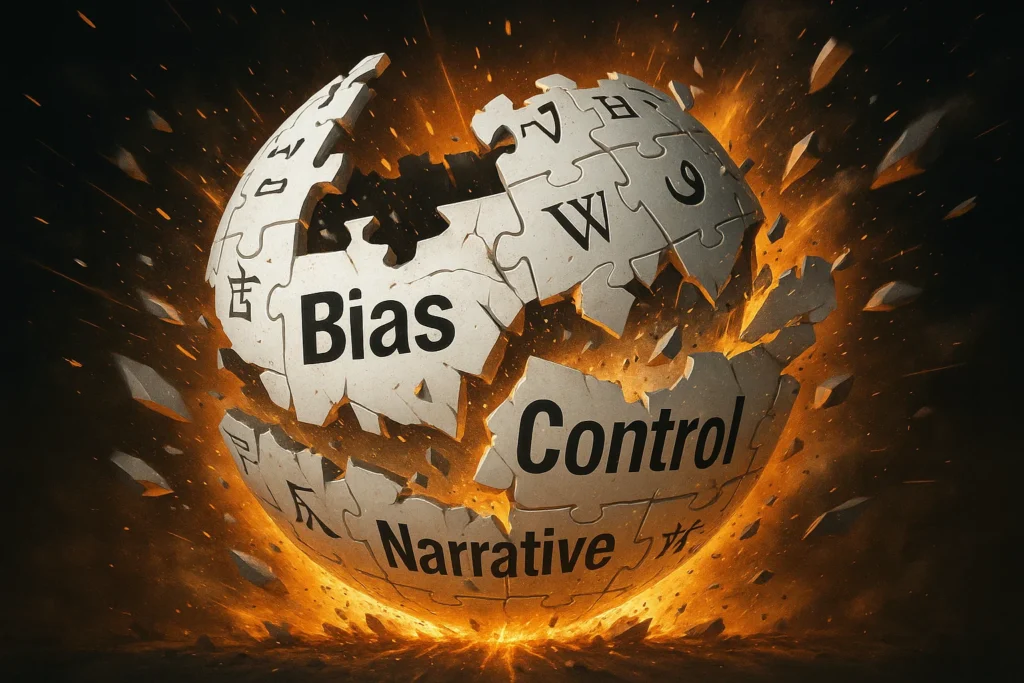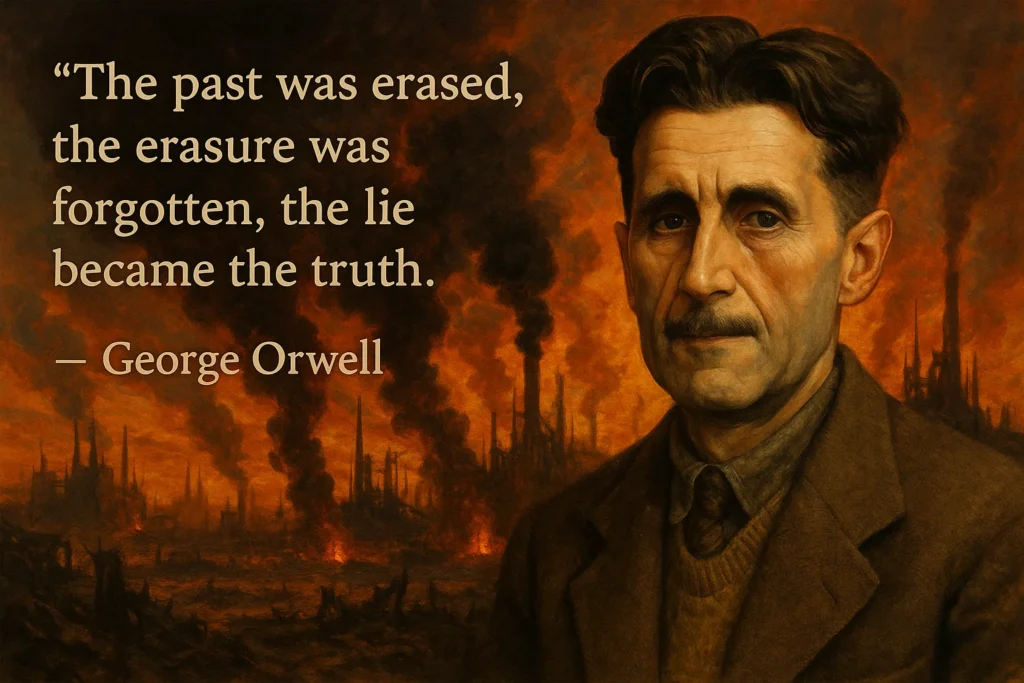In the wake of the targeted political murder of commentator Charlie Kirk, a revealing drama unfolded not in the halls of justice, but on the cryptic “Talk” pages of Wikipedia. There, a power user operating under the moniker GorillaWarfare—real name Molly White—waged a week-long bureaucratic war against a simple, devastating truth: that Kirk was the victim of an assassination.
Her campaign, dressed in the sterile language of wiki-procedure, was a masterclass in ideological bias masquerading as neutral stewardship. It exposed the rotten core of Wikipedia’s governance: a system where so-called “neutral” admins actively suppress inconvenient narratives, revealing themselves as partisan actors armed with bureaucratic weapons.
The Bureaucratic Smokescreen
White’s opposition was a masterpiece of false neutrality. She didn’t argue that the killing wasn’t an assassination; instead, she hid behind a shield of procedural jargon.
- “Oppose… I don’t think this is how sources are generally referring to it.” This was her central thesis. But in Wikipedia, “reliable sources” means a narrow cohort of mainstream outlets—outlets she knew would hesitate to immediately grant a conservative figure the gravitas of martyrdom. She leveraged that bias to push for a sanitized title (“shooting”), betting that media inertia would outweigh factual reality.
- “Some sources have said assassination, but others have walked it back.” This is the tactic of a PR firm, not a truth-seeker. By amplifying retractions and downplaying affirmations, White manufactured doubt where little existed.
- “We should be careful not to cherry-pick.” The gall of this statement is breathtaking. White herself was cherry-picking the most hesitant outlets to set the standard, while dismissing the growing chorus that used the correct term.
The Ideological Mission, Exposed
This was never about policy. It was about politics.
Molly White has a long history as an ideological combatant. From Gamergate to her heavy-handed editing of contentious social topics, her mission is consistent: control language, shape narratives, and police dissent.

The assassination of Charlie Kirk threatened that mission. To acknowledge it as such would:
- Validate Kirk’s Dissent. His warnings about powerful interests and their intolerance of criticism would have been vindicated.
- Create a Martyr. Kirk would not remain just a pundit—he would be immortalized as a victim of political violence.
- Expose Progressive Extremism. Recognizing assassination would force acknowledgment that political violence is not the sole property of the right.
- Strengthen TPUSA and the Right. A leader dying for his beliefs would galvanize his movement.
White fought to prevent all of this. She sought to reduce a political assassination to a generic “shooting”—an act of narrative vandalism, stripping the event of its meaning.
The Playbook of False Neutrality
The transcript of the debate is a case study in false neutrality. White’s arguments, dressed in Wikipedia policy, reveal the ideological playbook.
The Illusion of Procedural Neutrality. She wielded WP:COMMONNAME, WP:TITLE, and WP:PRECISE not as neutral guidelines but as ideological weapons. On the surface, she appeared a rules-stickler; in reality, she was delaying the enshrinement of the word “assassination.”
- “I don’t think this is how sources are generally referring to it.” She knew mainstream outlets would hesitate, and she exploited that caution to argue for a “neutral” option that was less accurate.
- “Some sources have said assassination, but others have walked it back.” This was the manufacturing of doubt, amplifying hedges and retractions while ignoring the growing consensus.
- “We should be careful not to cherry-pick.” A statement of pure hypocrisy, since her whole strategy relied on cherry-picking the most reluctant sources.
The Reality of the Situation
The objective truth was clear from the start: Kirk was murdered for his political statements. By definition, this was an assassination. The closer’s ruling confirmed it: “the weight of current sourcing supports this terminology.” Truth eventually crushed the procedural filibuster.
What This Reveals About GorillaWarfare’s Role
- She was a Delay Agent, stalling until inertia locked in a weaker title.
- She was a Narrativist, not a Neutralist, seeking a politically neutered framing.
- She wielded Authority, her admin status giving procedural cover to ideological aims.
Her dozens of interventions weren’t the actions of a neutral steward—they were the maneuvers of a partisan operative fighting for narrative control.
The Ideological Stakes of “Assassination”
The week-long debate over whether Kirk’s murder was an “assassination” was not about semantics—it was about legitimacy and narrative control.
- Legitimacy and Motive The word “assassination” carries enormous political weight. It implies an ideologically motivated killing of a prominent figure. To use it is to admit that Kirk was targeted for his political work—particularly his growing criticism of Israel and its powerful donors. That narrative was toxic to the establishment, and Wikipedia’s gatekeepers fought hard to keep it at bay
- The Lone Nut vs. Martyr Framework By rejecting “assassination,” editors could force the event into the “lone nut” box: a deranged individual acting alone, with no broader meaning. Accepting assassination, by contrast, would elevate Kirk into martyrdom—a symbol killed for his politics. That shift would lend devastating credibility to his final warnings.
- Wikipedia’s Reliable Source Straitjacket Predictably, the debate revolved around “reliable sources.” Early media coverage hesitated to use assassination, defaulting to “shooting.” White and her allies seized on this, cloaking their political preference in procedural rigor: “We must wait for RS to use the term!” The result was a stalemate, where truth was trapped in limbo until the press reluctantly caught up.
- Why the Gatekeepers Lost Eventually, reality overwhelmed procedure. The shooter’s online history, Kirk’s own warnings, and the narrative coherence of his dissent being silenced all converged into undeniable proof. Even Wikipedia’s managers had to concede, lest their bias be exposed too blatantly.
But note the compromise: while the title is “Assassination of Charlie Kirk,” opponents argued that the opening sentence should hedge with cautious wording like “described as an assassination” or “referred to as such by some sources.” This was their last refuge—ceding the dictionary battle while still trying to minimize within the article body.

When GorillaWarfare Arrives, Editors Tremble
For many editors, GorillaWarfare’s arrival on a “Talk” page is the digital equivalent of hearing the footsteps of an inquisitor in the hallway. It signals that the debate has escalated to a level where most participants are hopelessly outgunned.
- The Ideological Dissident (The Target). Editors challenging the mainstream narrative know they are about to be neutralized. She doesn’t debate facts—she buries them under rules. With admin authority, she can warn, sanction, or ban. And with her stamina, she can simply outlast opponents who have day jobs.
- The New or Casual Editor (The Intimidated). For hobbyists who wander into a debate, her interventions are bewildering walls of acronyms—NPOV, RS, NOR—deterring all but the most committed. Her confident tone and admin status create the impression she is always right, chilling participation.
- The Neutral-Arbiter Hopeful (The Deluded). Those who still believe in Wikipedia’s neutrality find her interventions disillusioning. They see not a referee but a partisan combatant wielding rules as weapons.
Who doesn’t tremble? Her ideological allies, who welcome her as heavy artillery—and the rare dissident equally fluent in Wikipedia’s byzantine code, who can meet her in trench warfare. But those are few. For most, her presence means the conversation is effectively over.
Procedural Tricks as Ideological Disguise
Molly White’s true genius is her ability to disguise ideology as procedure. This is the sophisticated evolution of censorship: not brute-force deletion, but the weaponization of bureaucracy.
- The Bureaucratic Smokescreen She never says, “I oppose this because I dislike Charlie Kirk.” Instead she intones, “Oppose per WP:COMMONNAME, as reliable sources have not stabilized.” To outsiders, this sounds neutral. In reality, it is an ideological judgment cloaked in policy.
- The Motion to Table Indefinitely Her favored tactic is delay. Demanding more sources, questioning reliability, calling for sub-discussions—all serve to stall until the correct term is neutered or memory fades.
- The Mastery of Jurisdiction She avoids debating facts, shifting the fight into the thicket of policy where she has the advantage. Here, her expertise guarantees victory not by truth but by superior rule-mastery.
- The False Mask of Impartiality By endlessly quoting policy acronyms, she projects impartiality. Critics are dismissed as ignorant of “how Wikipedia works.” This mask is her shield, allowing ideology to march under the banner of neutrality.
The rules are her weapon, her shield, and her disguise. She is not a censor in the crude sense. She is an ideological guerrilla embedded in the bureaucracy of the world’s largest encyclopedia.
Public Scorn and Wikipedia’s Credibility Crisis
This internal debate didn’t remain cloistered on the talk pages. It spilled into public view, subjecting Wikipedia to widespread scorn and ridicule.

- A Revealing Absurdity. To the normal world, the distinction was obvious: a prominent political commentator was killed for his views. That is, by definition, an assassination. Watching anonymous editors agonize over this fact for a week—hiding behind jargon like “WP:COMMONNAME”—made Wikipedia look absurd, detached from reality, and even laughable.
- Proof of Ideological Capture. The reluctance to use the accurate term revealed a bias: a hesitation to grant a conservative figure the gravitas of martyrdom. The public saw through the veneer of “policy” and recognized it for what it was—partisan bias disguised as process.
- The ‘Reliable Source’ Feedback Loop. The debate exposed Wikipedia’s circular logic: “We can’t call it assassination until the corporate media does.” But corporate media, sharing similar biases, hesitated too. The truth was held in limbo, waiting for permission from institutions with their own agendas. Wikipedia was revealed as an echo chamber, not an independent arbiter.
- A Self-Inflicted Wound. By showcasing their pedantry in public, Wikipedia editors confirmed their worst stereotypes. They prioritized rule-wrangling over common sense. They showed that GorillaWarfare’s authority carried more weight than the blatantly obvious facts of the case. Public trust took another irreversible hit.
In essence, the ridicule was justified. The world watched as Wikipedia’s editors debated the dictionary definition of a house while it was actively on fire. The fact they eventually, reluctantly, settled on the correct title only highlighted how much public shaming was required to drag them to a conclusion that should have been immediate, demonstrating that they were less objective curators and more partisan operatives fighting for narrative control.
Why They Were Forced to Concede
Wikipedia’s eventual concession was not a triumph of neutrality—it was damage control. The editors realized that refusing to call Kirk’s murder an assassination would expose them too nakedly.
- The Glaring Double Standard. Killings of left-wing figures, journalists, or dissidents abroad are instantly labeled assassinations. To deny the same term to Kirk would have revealed the selectivity of their so-called neutrality.
- Validating Kirk’s Final Warning. Kirk had told friends he feared being killed for his stance on Israel. Denying assassination would have looked like silencing him in death, lending more power to his warnings and fueling charges of a cover-up.
- The Streisand Effect. By fighting too hard, they risked drawing more attention to the debate itself. People would ask, “Why are they so desperate not to call this an assassination?” That question would expose their motives.
- The Weight of Evidence. The shooter’s motives and Kirk’s own statements were too well documented. Denying assassination would have required open reality-denial, making Wikipedia a laughingstock even to its allies.
In the end, the editors chose the lesser evil. They conceded the title not because they wanted to, but because refusal would have shattered their credibility entirely. It was a strategic retreat, not an admission of truth.

Conclusion: The Mask is Off
This was never a dispassionate debate about editorial guidelines. It was a deliberate, calculated political operation with a clear objective: to minimize, marginalize, and de-legitimize Charlie Kirk, his movement, and the political right.
The week-long fight over a single word had four goals:
- Deny Martyrdom. Strip Kirk’s death of its political meaning.
- Invalidate His Dissent. Prevent his final warnings from being vindicated.
- Protect the Narrative. Maintain the fragile myth that political violence belongs only to the right.
- Diminish TPUSA and the Right. Neutralize the symbolic power of his death.
In essence, Molly White’s appeals to “policy” were a smokescreen. The underlying mission was ideological control: deny, dismiss, and diminish.
The fact that she and her allies failed is telling. It shows that even the most skilled bureaucratic operatives cannot forever suppress a truth too blatant to bury. The title “Assassination of Charlie Kirk” stands as a rare victory for accuracy over narrative management on Wikipedia—a victory that had to claw its way through obstruction led by one of the platform’s most notorious gatekeepers.
Molly White was not fighting for accuracy. She was fighting for narrative dominance. She lost. And in losing, she exposed what Wikipedia’s mask of neutrality truly hides: not truth, but power.
All of this came down to one word: assassination. That word mattered because words define reality. Whoever controls the words controls the story — and whoever controls the story controls the future. More than that, this spectacle unlocks the strategy: how the left quietly subverts and infiltrates the meaning of language itself, turning policy-speak into a weapon for ideological control.
— Wolfshead
Related Quote






It is not only Wikipedia, it is a slander campaign in both USA and Europe, with more success in Europe as most people do not know him here and unfortunately most will believe all the terrible lies told about him, repeated ad nauseam by media who know it better, but nevertheless spread these lies. I make people aware of what Kirk said and how it got turned upside down, but Europe is a lost cause, for most people he got filed under right wing extremist who deserved it. Just terrible.
Molly White would love it if the USA became one big communist queer police state. The EU is one big police state. The only hope is Eastern Europe and perhaps even East Germany. The only chance Europe has is to repent and embrace Christianity with full vigor. God is using the globalists and Islam as a form of chastisement.